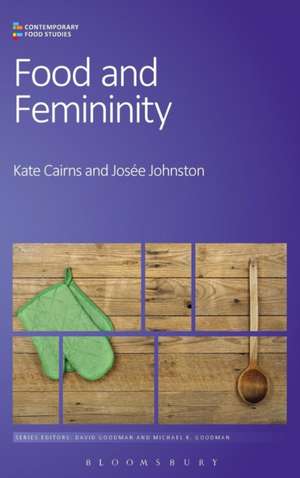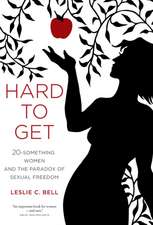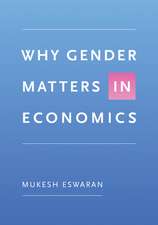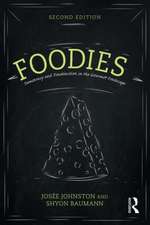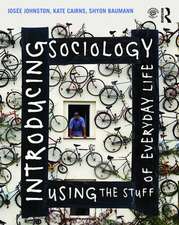Food and Femininity: Contemporary Food Studies: Economy, Culture and Politics
Autor Dr Kate Cairns, Assistant Professor Josée Johnstonen Limba Engleză Hardback – 23 sep 2015
| Toate formatele și edițiile | Preț | Express |
|---|---|---|
| Paperback (1) | 178.65 lei 6-8 săpt. | |
| Bloomsbury Publishing – 23 sep 2015 | 178.65 lei 6-8 săpt. | |
| Hardback (1) | 539.73 lei 3-5 săpt. | |
| Bloomsbury Publishing – 23 sep 2015 | 539.73 lei 3-5 săpt. |
Preț: 539.73 lei
Preț vechi: 689.63 lei
-22% Nou
Puncte Express: 810
Preț estimativ în valută:
103.27€ • 108.12$ • 85.45£
103.27€ • 108.12$ • 85.45£
Carte disponibilă
Livrare economică 15-29 martie
Preluare comenzi: 021 569.72.76
Specificații
ISBN-13: 9780857855527
ISBN-10: 0857855522
Pagini: 240
Ilustrații: 20 bw illus
Dimensiuni: 156 x 234 x 14 mm
Greutate: 0.51 kg
Editura: Bloomsbury Publishing
Colecția Bloomsbury Academic
Seria Contemporary Food Studies: Economy, Culture and Politics
Locul publicării:London, United Kingdom
ISBN-10: 0857855522
Pagini: 240
Ilustrații: 20 bw illus
Dimensiuni: 156 x 234 x 14 mm
Greutate: 0.51 kg
Editura: Bloomsbury Publishing
Colecția Bloomsbury Academic
Seria Contemporary Food Studies: Economy, Culture and Politics
Locul publicării:London, United Kingdom
Caracteristici
The first text to interrogate the relationship between food and women linking consumer culture
Notă biografică
Kate Cairns is an Assistant Professor of Childhood Studies at Rutgers University, USA. Josée Johnston is Associate Professor of Sociology at the University of Toronto, Canada.
Cuprins
A Personal Food Prologue1. Caring About Food2. Thinking through Food and Femininity: A Conceptual Toolkit3. Trolling the Aisles and Feeling Food Shopping4. Maternal Foodwork: The Emotional Ties that Bind5. The "Do-Diet": Embodying Healthy Femininities6. Food Politics: The Gendered Work of Caring Through Food7. Food Pleasures in the Postfeminist Kitchen 8. Conclusion: Cooking as a Feminist Act?Appendix A: Participant DemographicsAppendix B: MethodsAppendix C: Discourse Analysis of Food MediaReferencesIndex
Recenzii
Food and Femininity helps us to further understand why women invest so much energy in foodwork . [and] reminds us that the pressures surrounding food are immense for women - not just in terms of foodwork but in terms of the implications for their own weight management and the nearly universal goal of thinness.
Women do not all react to foodwork in the same uniform manner. Food and Femininity therefore offers a useful exploration of food and the construction of femininities, and demonstrates how food itself can be used as a means by which social inequalities can be uncovered.
[Cairns and Johnston] provide thought-provoking contributions to the fields of feminist scholarship and food studies. Summing Up: Recommended. Upper-division undergraduates through researchers and faculty.
Cairns and Johnston's book is sure to be of interest to a wide range of academics-critical geographers, anthropologists, and sociologists alike-not merely those who have a distinguished taste for food research.
With their call for the development of feminist food studies and feminist food politics, Cairns and Johnston contribute to an important perspective in the multivocal dialectic on gender and food.
Cairns and Johnston take forward understanding food politics by focusing on how femininity is performed through foodwork practices. Through an immersion in the processes of decision making for household food choices, Food and Femininity offers a rich account of the thorny tensions faced by shoppers attempting to work out food ethics in their everyday eating lives .this book offers a rich and rigorous contribution to examinations of contemporary western food politics . [and] not only examines food and femininity, it also sets out feminist methodologies for researching food issues.
Overall, this book was excellent and I would highly recommend it for anyone interested in the sociological study of food and/or gender. It is scholastically rigorous, but remains firmly grounded in the everyday, real life experiences of women who care about food. In addition to its thoughtful and careful theoretical analysis of the varied performances of food femininities, the authors helpfully provide readily relatable examples and anecdotes to illustrate their ideas. This had the effect of connecting both theory and practice in a seamless and engaging way.
Finally, a book that gives a thorough, scholarly treatment to a phenomenon that affects so many women on a daily basis, sometimes quite painfully: negotiating the ever fraught cultural messages about shopping, cooking, serving, and eating food right, including the exhortations that we should simply relax about these things.
Mom is in the kitchen making dinner. She is also "doing gender," reinforcing stereotypes that a woman's place is in the home. Why are women still responsible for feeding the family in our postfeminist age? Food and Femininity reveals the pleasures-as well as the inequities-of home cooking.
A brilliant book that will set the agenda for future debates about gender and food. Combining rich empirical material and persuasive theorizing, Cairns and Johnston demonstrate why contemporary food practices raise crucial issues for feminism.
In this path-breaking work, the authors show how femininity is both empowering and constraining for women, and how this tension plays out in the food arena.
.Food and Femininity is a highly readable and informative text that offers an up-to-date, contemporary analysis of the longstanding discussion of the relationship between femininity and food . The book is a valuable addition to the burgeoning field of feminist food studies, particularly because Cairns and Johnston incorporate intersectional analysis throughout the text, being careful to examine the ways in which gender intersects with race/ethnicity and class to shape women's experiences with food. More than this, Food and Femininity adds to the development of a collective feminist food politics.
Women do not all react to foodwork in the same uniform manner. Food and Femininity therefore offers a useful exploration of food and the construction of femininities, and demonstrates how food itself can be used as a means by which social inequalities can be uncovered.
[Cairns and Johnston] provide thought-provoking contributions to the fields of feminist scholarship and food studies. Summing Up: Recommended. Upper-division undergraduates through researchers and faculty.
Cairns and Johnston's book is sure to be of interest to a wide range of academics-critical geographers, anthropologists, and sociologists alike-not merely those who have a distinguished taste for food research.
With their call for the development of feminist food studies and feminist food politics, Cairns and Johnston contribute to an important perspective in the multivocal dialectic on gender and food.
Cairns and Johnston take forward understanding food politics by focusing on how femininity is performed through foodwork practices. Through an immersion in the processes of decision making for household food choices, Food and Femininity offers a rich account of the thorny tensions faced by shoppers attempting to work out food ethics in their everyday eating lives .this book offers a rich and rigorous contribution to examinations of contemporary western food politics . [and] not only examines food and femininity, it also sets out feminist methodologies for researching food issues.
Overall, this book was excellent and I would highly recommend it for anyone interested in the sociological study of food and/or gender. It is scholastically rigorous, but remains firmly grounded in the everyday, real life experiences of women who care about food. In addition to its thoughtful and careful theoretical analysis of the varied performances of food femininities, the authors helpfully provide readily relatable examples and anecdotes to illustrate their ideas. This had the effect of connecting both theory and practice in a seamless and engaging way.
Finally, a book that gives a thorough, scholarly treatment to a phenomenon that affects so many women on a daily basis, sometimes quite painfully: negotiating the ever fraught cultural messages about shopping, cooking, serving, and eating food right, including the exhortations that we should simply relax about these things.
Mom is in the kitchen making dinner. She is also "doing gender," reinforcing stereotypes that a woman's place is in the home. Why are women still responsible for feeding the family in our postfeminist age? Food and Femininity reveals the pleasures-as well as the inequities-of home cooking.
A brilliant book that will set the agenda for future debates about gender and food. Combining rich empirical material and persuasive theorizing, Cairns and Johnston demonstrate why contemporary food practices raise crucial issues for feminism.
In this path-breaking work, the authors show how femininity is both empowering and constraining for women, and how this tension plays out in the food arena.
.Food and Femininity is a highly readable and informative text that offers an up-to-date, contemporary analysis of the longstanding discussion of the relationship between femininity and food . The book is a valuable addition to the burgeoning field of feminist food studies, particularly because Cairns and Johnston incorporate intersectional analysis throughout the text, being careful to examine the ways in which gender intersects with race/ethnicity and class to shape women's experiences with food. More than this, Food and Femininity adds to the development of a collective feminist food politics.
